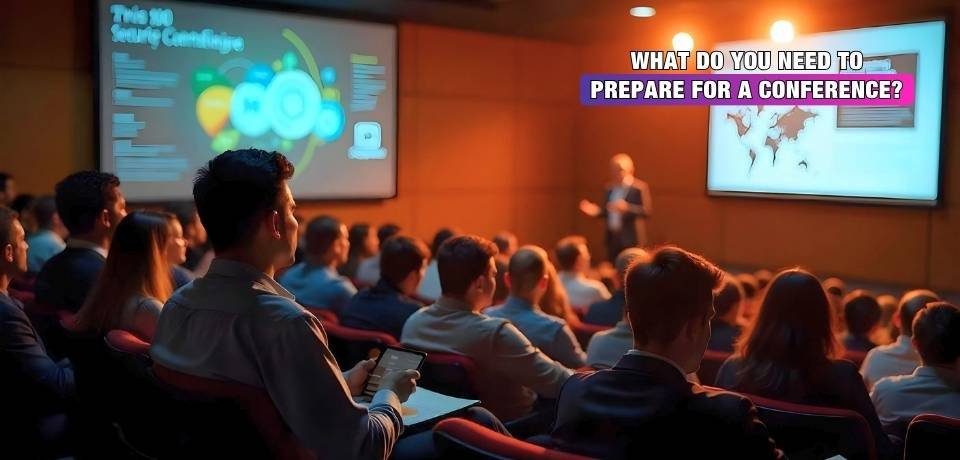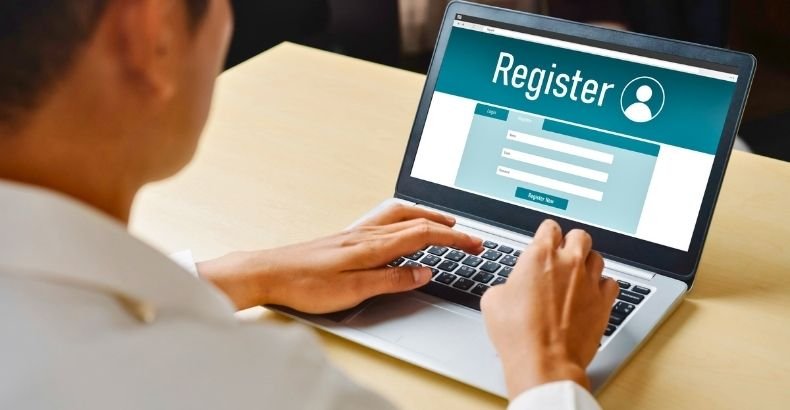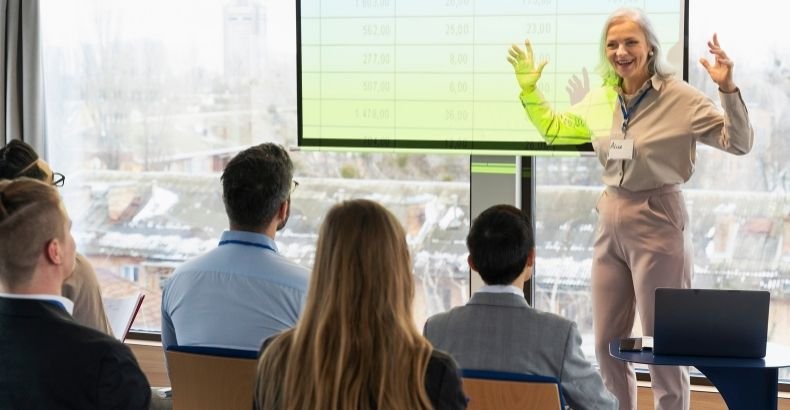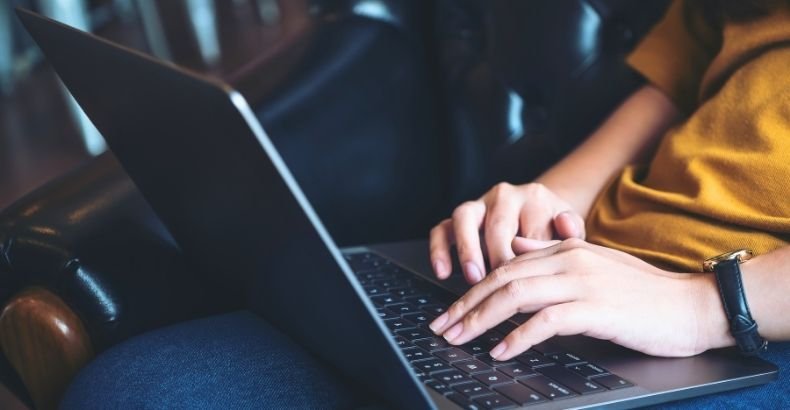Attending a conference is an exciting opportunity to connect with industry experts, share your ideas, and stay updated on the latest trends in your field. However, the key to making the most of this experience lies in thorough preparation.
Whether you’re presenting a paper, networking, or simply attending sessions, planning ensures a seamless and productive experience. So, what do you need to prepare for a conference?
To prepare for a conference, research the event thoroughly to understand its goals and key sessions. Plan your itinerary, pack essentials like business cards and chargers, set clear networking goals and mentally prepare to stay focused and adaptable.
This guide will walk you through the essentials, helping you feel confident and ready to take full advantage of your time at the conference. With the right approach, you’ll not only leave a lasting impression but also gain valuable insights and connections.
What is the Importance of Conference Preparation?
Effective conference preparation is crucial for maximizing the benefits of attending any professional gathering. It ensures you are well informed about the event’s agenda, speakers, and topics, allowing you to align your goals with the conference’s objectives. This groundwork enables meaningful participation and helps you make the most of networking opportunities.
Preparing for a conference also involves organizing your materials and refining your presentation if you are a speaker. Thoughtful preparation boosts confidence, ensures clarity, and enhances your ability to engage with your audience. Even attendees benefit by preparing questions or discussion points in advance, encouraging more impactful conversations.
For professionals, especially in competitive industries, being well-prepared for upcoming business conferences is vital for staying relevant. These events provide a unique platform to showcase expertise, build connections, and identify new trends that can drive future success.
What Do You Need to Prepare for a Conference?
Now that we know why preparation is important, let’s look at what you need to do to prepare for a conference. Below, we’ll walk through the essential steps that will ensure you’re fully prepared.

Research the Conference
One of the most important steps in preparing for a conference is doing thorough research. Start by learning about the event’s goals, the target audience, and the key themes. Look into the sessions, workshops, and keynotes that interest you the most. Familiarize yourself with the speakers, especially those relevant to your field. Researching the event ahead of time allows you to prioritize your schedule and plan your day accordingly.
Plan Your Itinerary
Conferences often have packed schedules, with multiple sessions happening simultaneously. To avoid being overwhelmed, plan your itinerary carefully. Choose the sessions, keynotes, and workshops that are most relevant to your goals. Block out time for networking opportunities, meals, and breaks. You don’t want to miss out on important parts of the conference because you’re rushing from one session to another.
Prepare Your Presentation
If you’re presenting at the conference, ensure that your presentation is well-prepared in advance. This includes creating engaging slides, practicing your delivery, and anticipating questions from the audience. A great presentation can leave a lasting impression and open doors to new opportunities, so don’t rush through this step. Be sure to test your equipment beforehand to avoid any technical issues on the day of your presentation.
Pack the Right Essentials
Packing is a crucial part of your conference preparation. Here’s what you should bring:
- Business Cards: Conferences are great for networking, and you’ll want to exchange contact information easily.
- Technology: Bring a fully charged laptop or tablet, along with chargers and any other tech accessories you might need.
- Comfortable Clothing: Even though you should dress professionally, you should also be comfortable. Conferences often involve long days, so opt for business casual attire that you feel comfortable in.
- Notebook and Pen: While digital devices are convenient, sometimes a notebook and pen are the best tools for jotting down quick notes during sessions.
Set Networking Goals
Networking is one of the main reasons people attend conferences, so set goals before the event. Think about the types of connections you want to make. Are you looking to meet potential clients, partners, or industry experts? Setting clear networking goals will help you focus your efforts and make the most of your time at the event. Additionally, make a list of key individuals or companies you’d like to connect with to ensure you don’t miss out on valuable conversations.
Prepare Mentally
Conferences can be intense, especially if you’re new to them. Take some time to prepare mentally by reviewing your schedule, getting enough rest, and managing your expectations. When you prepare for attending a business conference, you should stay focused on the sessions that align with your goals. Remember, you don’t have to attend every session or meet every person. Focus on quality over quantity, and be ready to adapt if things don’t go as planned.
By setting clear goals and mentally preparing yourself for the conference, you’re ensuring that you’ll have a productive and rewarding experience. Thoughtful planning will allow you to stay focused, relaxed, and open to new opportunities throughout the event.
Key Steps to Take Before the Conference Participation
Preparation before a conference sets the foundation for a successful experience. By taking the right steps early on, you can reduce stress and make the most of the event. Here’s a list of key steps to ensure you’re fully prepared.

Step 1: Register Early
Make sure to register for the conference as soon as possible. Early registration often comes with perks, such as discounted fees or access to exclusive sessions. Plus, registering early ensures that you get all the necessary information in advance, such as venue details and updates on the conference schedule. It also gives you time to adjust any plans if the conference dates or details change.
Step 2: Book Travel and Accommodation
If the conference is in a different city or country, you’ll need to arrange your travel and accommodation early. Look for hotels close to the conference venue to save time on commuting. Also, consider arriving a day before the event to settle in and avoid any last-minute stress. Booking early can also help you find better deals on flights or hotels.
Step 3: Review the Agenda
Once the conference agenda is available, take some time to review it. Highlight the sessions that interest you the most and make note of any that overlap. Prioritize your must-attend sessions, but also be flexible in case of changes or opportunities for spontaneous networking. Reviewing the agenda ahead of time helps you create a clear schedule for the day.
Step 4: Download the Conference App
Many conferences now have mobile apps, which offer features like real-time updates, maps, and session reminders. Download the app ahead of time and explore its features. This will help you stay organized during the event and avoid missing important sessions. Using the app can also help you connect with other attendees before the conference even starts.
Step 5: Prepare a Networking Strategy
Before the conference, reach out to any attendees or speakers you’d like to connect with. This could be through email, LinkedIn, or even the conference app. Having a strategy in place will make it easier to approach people and strike up conversations once you’re at the event. A plan will also ensure you don’t miss key people you want to meet.
Step 6: Set Personal Goals
Decide what you want to achieve by attending the conference. Whether it’s gaining new knowledge, meeting industry leaders, or improving your professional skills, having clear goals will help you stay focused throughout the event. Setting goals gives you direction and ensures you leave the conference feeling accomplished.
Step 7: Prepare Your Elevator Pitch
You’ll likely meet many new people at conferences, so networking is a key part of the event. Prepare a short, engaging elevator pitch that sums up who you are, what you do, and what you’re looking for. Keep it concise but informative. Having a well-rehearsed pitch will help you make a strong first impression.
How to Research the Conference Agenda and Speakers?
Knowing who the speakers are and understanding the agenda are crucial parts of conference preparation. It helps you prioritize sessions, identify key speakers, and ensure that you’re attending the most relevant events for your goals. Here’s how you can effectively research these aspects,
- Study the Conference Website: Most conferences have a dedicated website where they post information about the agenda, speakers, and session topics. Visit the website and take note of the sessions that align with your interests. Make sure you understand the schedule, including any breaks or networking events.
- Research the Speakers: If the conference features well-known industry leaders or experts, take some time to learn more about them. Look at their backgrounds, professional achievements, and past speaking engagements. Knowing a bit about the speakers will give you talking points during networking opportunities.
- Check for Updates: Conference schedules can change, so check for updates regularly. Whether it’s a change in session times or the addition of new speakers, staying informed will help you adapt your plans accordingly.
- Read Reviews of Past Conferences: If this conference is held annually, look for reviews or feedback from past attendees. This can give you a sense of what to expect in terms of organization, session quality, and networking opportunities.
- Plan Your Must-Attend Sessions: Based on your research, highlight the sessions you absolutely don’t want to miss. A plan will help you manage a busy conference schedule and ensure you’re getting the most out of your time.
Essential Items to Pack for the Conference
Packing for a conference is about more than just clothes. You’ll need to bring certain items that will help you stay organized, network effectively, and stay connected. Packing the right items for a conference is crucial to ensuring that you’re prepared for every aspect of the event. Here’s a list of essentials you should bring with you:
- Business Cards: Business cards are a must-have at any conference. They make it easy to exchange contact information and leave a lasting impression. Make sure you have plenty of them on hand, as you’ll likely be meeting many new people.
- Portable Charger: Conferences often involve long days, and you’ll be using your phone or laptop frequently to check the schedule, take notes, or network. A portable charger will ensure that you don’t run out of battery when you need it most.
- Notebook and Pen: While digital devices are great for taking notes, sometimes a traditional notebook and pen are more convenient. Use them for quick note-taking during sessions or when your phone is out of battery.
- Comfortable Shoes: You’ll likely be on your feet a lot during the conference, so make sure to wear comfortable shoes. Opt for professional yet comfortable footwear that allows you to move around easily.
- Reusable Water Bottle: Conferences can be long and tiring, so staying hydrated is important. Bring a reusable water bottle that you can refill throughout the day.
- Snacks: Conferences don’t always provide snacks between meals, so pack some energy bars or other quick snacks to keep you going throughout the day.
How to Connect with Other Attendees? (Network Strategies)
Networking is one of the biggest benefits of attending conferences. But how do you make meaningful connections with other attendees? Here, we’ll explore strategies to help you network effectively. Attending a conference means networking.

Be Approachable
Smile, make eye contact, and be open to conversations. People are more likely to approach you if you appear friendly and approachable. Whether you’re waiting in line for coffee or attending a session, being approachable is the first step to networking effectively. A warm, welcoming attitude makes others feel comfortable and can lead to productive connections.
Engage in Conversations
During breaks or networking events, don’t be afraid to strike up conversations with other attendees. Ask about their background, what sessions they’ve attended, and what they hope to gain from the conference. People appreciate genuine interest and are more likely to engage in meaningful discussions. Keep the conversation light and positive to build rapport easily.
Use Social Media
Many conferences encourage attendees to connect via social media. Join the conversation by using the event’s hashtag on platforms like Twitter or LinkedIn. You can also reach out to attendees you’ve met in person and continue the conversation online. Posting insights or photos from the event can also help you stay visible and engage with a wider audience.
Follow Up
After the conference, be sure to follow up with the people you’ve met. Send a quick message or email thanking them for the conversation and expressing your interest in staying in touch. Following up helps solidify the connections you’ve made and keeps the relationship going. This small effort can turn a brief meeting into a lasting professional relationship.
Tips for a Successful Presentation At a Conference
If you’re presenting at a conference, preparation is crucial. A successful presentation can leave a lasting impression on your audience and open up new opportunities. In that case, knowing the essential steps in conference preparation can help you present your expertise effectively. Here’s how to ensure your presentation is a success.

Know Your Audience
The key to delivering a successful presentation is knowing your audience. Organize your content to the audience’s level of knowledge and interest. If you’re speaking to industry experts, you can use more technical language. However, if your audience is new to the topic, make sure your content is accessible and easy to understand.
Practice, Practice, Practice
The more you practice your presentation, the more confidence you’ll feel. Rehearse your presentation several times, paying attention to your timing, tone, and body language. Consider practicing in front of a colleague or friend to get feedback.
Use Visual Aids Effectively
Slides or other visual aids can enhance your presentation, but make sure they’re clear and not overloaded with information. Use visuals to support your key points, but avoid reading directly from the slides. Your audience wants to hear your insights, not just read text off a screen.
Engage with the Audience
Make your presentation interactive by asking questions, encouraging discussion, or using real-life examples. Engaging with the audience helps keep their attention and makes your presentation more memorable.
How to Manage Your Time Effectively During the Conference?
Managing your time effectively during a conference is crucial to ensure you gain the maximum benefit from the event. With a packed schedule of sessions, networking opportunities, and personal breaks, proper planning can make all the difference.
- Plan Your Schedule in Advance: Review the conference agenda and select the sessions, workshops, or panels that align with your goals. Prioritize these events and build your day around them to avoid overlapping commitments.
- Set Networking Goals: Identify key individuals or groups you want to connect with beforehand. Allocate time during breaks or networking events to encourage meaningful interactions.
- Stay Organized with a Time Tracker: Use a conference app, calendar, or planner to track your sessions and activities. Set reminders to stay on top of your schedule and minimize delays.
- Balance Learning with Breaks: While it’s tempting to attend every session, ensure you schedule downtime to recharge. Short breaks can boost your focus and help you fully engage in later events.
- Reflect and Prioritize Daily: At the end of each day, review what you’ve learned and adjust your plans for the next day. This helps you make the most of your remaining time at the conference.
What Should You Do After the Conference Participation?
The work doesn’t end when the conference is over. Following up and reflecting on your experience are important parts of the conference process. Once the conference is over, there are still important steps you need to take to make the most of the experience. Here’s what you should do after the event:

Follow Up with Connections
After the conference, take the time to follow up with the people you met. Send a brief email or message thanking them for the conversation and expressing your interest in staying connected. This will help you maintain the professional relationships you’ve built during the event. Following up also shows your commitment to promoting long-term connections, making it easier to collaborate in the future.
Review Your Notes
Go through the notes you took during the sessions and workshops. Reflect on what you learned and how you can apply this knowledge to your work or personal development. Organize your notes in a way that makes it easy to reference them later. This ensures that you retain valuable insights and can share key takeaways with colleagues or use them for future projects.
Share Your Experience
If you found the conference valuable, share your experience with your colleagues or on social media. This not only helps reinforce what you’ve learned but also positions you as an active participant in your industry. Sharing also allows you to connect with others who may have attended the conference or are interested in your insights, further expanding your professional network.
Evaluate Your Goals
Take some time to evaluate whether you achieved the goals you set for the conference. Did you attend the sessions you wanted? Did you meet the people you hoped to connect with? Reflecting on your goals will help you plan for future conferences. This self-assessment also helps identify areas for improvement, ensuring you make even more of the next conference opportunity.
Frequently Asked Questions (FAQs)
Conferences can bring up many questions, especially for first-time attendees. Here are some common questions about conference preparation and their answers to help you feel more confident.
How Should a First-Time Attendee Prepare for a Conference?
For first-time attendees, preparation involves researching the conference schedule, setting networking goals, and packing essential items like business cards and a notebook. Arriving early and familiarizing yourself with the venue can also help ease any nerves. Being organized ahead of time will help you feel more confident and make the most of your experience.
How Do You Prepare for a Conference Presentation?
If you’re presenting, you’ll need to prepare your slides, rehearse your presentation, and anticipate audience questions. Customizing your content for the conference audience is also important. Practicing in front of a small group or colleague can help improve your delivery and boost your confidence before the big day.
Is Network Building a Priority When Attending a Conference?
Yes, when networking is your priority, focus on preparing an elevator pitch and researching key attendees. Bring plenty of business cards, and be proactive in introducing yourself to others. Set clear networking goals so you can focus on building meaningful connections during the event.
How Should a Speaker Prepare for a Conference?
As a speaker, preparation involves not only your presentation but also knowing the audience and theme of the conference. Make sure your presentation is aligned with the conference’s goals and that you practice it thoroughly. Arrive early to get comfortable with the venue and equipment.
Do You Need to Prepare for a Conference When You Attend Multiple Sessions?
If you’re attending multiple sessions, planning your schedule in advance is important. Prioritize the sessions that are most relevant to your goals, and don’t forget to leave time for networking and breaks. Using a conference app can help you keep track of sessions and make the most of your time at the event.
Final Words
The experience of attending a conference can be highly rewarding if you prepare properly. Organizing yourself in advance will help you make the most of every opportunity at the event, whether you’re learning, networking, or presenting.
To answer the question, “What do you need to prepare for a conference?” The key steps include researching the agenda, packing essential items, setting networking goals, and practicing your presentation if necessary. By focusing on these areas, you’ll ensure you’re fully ready for the event and able to make the most of your time there.
Remember to stay open to new experiences, connect with fellow attendees, and keep an organized schedule to avoid feeling overwhelmed. With these tips in mind, you’re well on your way to a successful conference experience. Best of luck, and enjoy every moment of it!